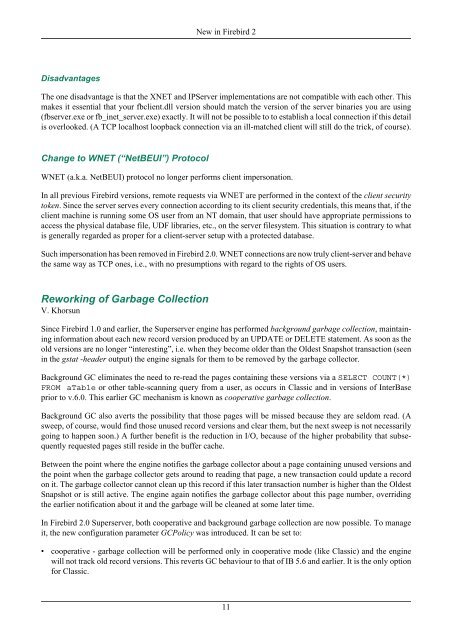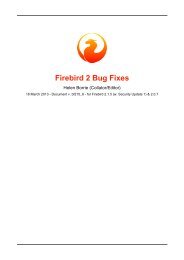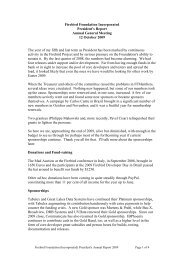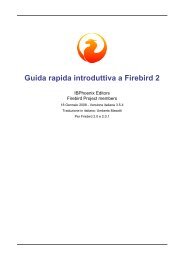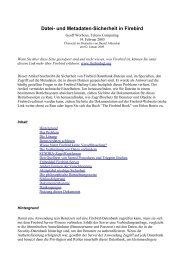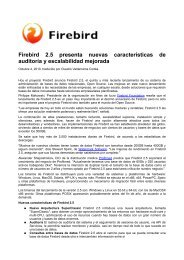Firebird 2.1 Release Notes
Firebird 2.1 Release Notes
Firebird 2.1 Release Notes
You also want an ePaper? Increase the reach of your titles
YUMPU automatically turns print PDFs into web optimized ePapers that Google loves.
Disadvantages<br />
New in <strong>Firebird</strong> 2<br />
The one disadvantage is that the XNET and IPServer implementations are not compatible with each other. This<br />
makes it essential that your fbclient.dll version should match the version of the server binaries you are using<br />
(fbserver.exe or fb_inet_server.exe) exactly. It will not be possible to to establish a local connection if this detail<br />
is overlooked. (A TCP localhost loopback connection via an ill-matched client will still do the trick, of course).<br />
Change to WNET (“NetBEUI”) Protocol<br />
WNET (a.k.a. NetBEUI) protocol no longer performs client impersonation.<br />
In all previous <strong>Firebird</strong> versions, remote requests via WNET are performed in the context of the client security<br />
token. Since the server serves every connection according to its client security credentials, this means that, if the<br />
client machine is running some OS user from an NT domain, that user should have appropriate permissions to<br />
access the physical database file, UDF libraries, etc., on the server filesystem. This situation is contrary to what<br />
is generally regarded as proper for a client-server setup with a protected database.<br />
Such impersonation has been removed in <strong>Firebird</strong> 2.0. WNET connections are now truly client-server and behave<br />
the same way as TCP ones, i.e., with no presumptions with regard to the rights of OS users.<br />
Reworking of Garbage Collection<br />
V. Khorsun<br />
Since <strong>Firebird</strong> 1.0 and earlier, the Superserver engine has performed background garbage collection, maintaining<br />
information about each new record version produced by an UPDATE or DELETE statement. As soon as the<br />
old versions are no longer “interesting”, i.e. when they become older than the Oldest Snapshot transaction (seen<br />
in the gstat -header output) the engine signals for them to be removed by the garbage collector.<br />
Background GC eliminates the need to re-read the pages containing these versions via a SELECT COUNT(*)<br />
FROM aTable or other table-scanning query from a user, as occurs in Classic and in versions of InterBase<br />
prior to v.6.0. This earlier GC mechanism is known as cooperative garbage collection.<br />
Background GC also averts the possibility that those pages will be missed because they are seldom read. (A<br />
sweep, of course, would find those unused record versions and clear them, but the next sweep is not necessarily<br />
going to happen soon.) A further benefit is the reduction in I/O, because of the higher probability that subsequently<br />
requested pages still reside in the buffer cache.<br />
Between the point where the engine notifies the garbage collector about a page containing unused versions and<br />
the point when the garbage collector gets around to reading that page, a new transaction could update a record<br />
on it. The garbage collector cannot clean up this record if this later transaction number is higher than the Oldest<br />
Snapshot or is still active. The engine again notifies the garbage collector about this page number, overriding<br />
the earlier notification about it and the garbage will be cleaned at some later time.<br />
In <strong>Firebird</strong> 2.0 Superserver, both cooperative and background garbage collection are now possible. To manage<br />
it, the new configuration parameter GCPolicy was introduced. It can be set to:<br />
• cooperative - garbage collection will be performed only in cooperative mode (like Classic) and the engine<br />
will not track old record versions. This reverts GC behaviour to that of IB 5.6 and earlier. It is the only option<br />
for Classic.<br />
11


